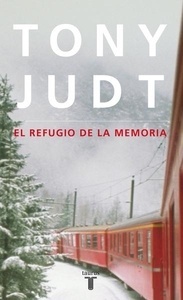El refugio de la memoria

Editorial Taurus
Fecha de edición marzo 2011 · Edición nº 1
Idioma español
Traducción de Azaola Rodríguez-Espina, Juan Ramón
EAN 9788430608171
248 páginas
Libro
encuadernado en tapa blanda
Dimensiones 13 mm x 21 mm
Resumen del libro
x{0026}lt;p x{0026}lt;B La autobiografía del intelectual de los intelectuales.x{0026}lt;/B x{0026}lt;/P x{0026}lt;P Cada capítulo evoca un recuerdo del pasado a través del filtro de la prodigiosa mente de Judt. Durante sus últimos meses de vida, escribir estas pequeñas piezas le permitió en cierto modo escapar de su enfermedad degenerativa, una prisión que se iba estrechando, y estas han pasado a ser el contrapunto personal de su obra maestra, x{0026}lt;I Postguerrax{0026}lt;/I .x{0026}lt;/P x{0026}lt;P Amores, vivencias, imágenes y olores hace tiempo perdidos... todos compiten por la atención de Judt y lo llevan a inesperadas y lúcidas reflexiones sobre la historia, la política y la sociedad hasta formar un elegante arco de análisis. Todo tan simple y hermosamente dispuesto como una casita suiza, un reconfortante e inalterable refugio perdido en las montañas de la memoria.x{0026}lt;/P x{0026}lt;P x{0026}lt;B La crítica ha dicho...x{0026}lt;/B x{0026}lt;BR Hermoso y conmovedor. A pesar de que Judt falleció demasiado pronto, esta obra póstuma es más reconfortante que triste. x{0026}lt;BR John Banville, x{0026}lt;I Thex{0026}lt;/I x{0026}lt;I x{0026}lt;/I x{0026}lt;I Guardianx{0026}lt;/I x{0026}lt;/P x{0026}lt;P La bellísima, impávida, heterodoxa confesión memorial de una persona que pone plazos a su irremediable sentencia volcándose en el interior de su cabeza (lo único intocado por el mal) y sacando de ella las armas de repudio de la muerte x{0026}lt;BR Vicente Molina Foix, x{0026}lt;I El Paísx{0026}lt;/I x{0026}lt;/P x{0026}lt;P El refugio de la memoria muestra al hombre sabio, ingenioso, sutil y, sobre todo, civilizado que hemos perdido. x{0026}lt;BR x{0026}lt;I Eveningx{0026}lt;/I x{0026}lt;I Standardx{0026}lt;/I x{0026}lt;/P
Biografía del autor
x{0026}lt;P x{0026}lt;B Tony Judt x{0026}lt;/B (Londres, 1948-Nueva York, 2010) realizó sus estudios en el King's College de Cambridge y en la École Normale Supérieure de París. Impartió clases en las universidades de Cambridge, Oxford, Berkeley y Nueva York, y en esta última ocupó la cátedra de Estudios Europeos, que él mismo fundó en 1995, y fue director del Remarque Institute. Entre sus publicaciones cabe destacar x{0026}lt;I El peso de la responsabilidadx{0026}lt;/I (Taurus, 2014), x{0026}lt;I ¿Una gran ilusión?x{0026}lt;/I (Taurus, 2013), x{0026}lt;I Pensar el siglo XXx{0026}lt;/I (Taurus, 2012), x{0026}lt;I El refugio de la memoriax{0026}lt;/I (Taurus, 2011), x{0026}lt;I Algo va malx{0026}lt;/I (Taurus, 2010), x{0026}lt;I Sobre el olvidado siglo XX x{0026}lt;/I (Taurus, 2008), x{0026}lt;I Pasado imperfectox{0026}lt;/I (Taurus, 2007), x{0026}lt;I Postguerrax{0026}lt;/I (Taurus, 2006), considerado uno de los diez mejores libros de 2005 por la x{0026}lt;I New York Times Book Reviewx{0026}lt;/I , galardonado con el Premio Council on Foreign Relations Arthur Ross y finalista del premio Pulitzer, y x{0026}lt;I Cuando los hechos cambianx{0026}lt;/I (Taurus, 2015). Judt colaboró en diferentes medios de Europa y Estados Unidos, como x{0026}lt;I The New York Review of Booksx{0026}lt;/I , el x{0026}lt;I Times Literary Supplementx{0026}lt;/I o x{0026}lt;I The New York Timesx{0026}lt;/I . En 2007 recibió el Premio Hannah Arendt, y en 2009 el Orwell Prize for Lifetime Achievement. Falleció en agosto de 2010 a causa de una enfermedad degenerativa.x{0026}lt;/P








